Postdoctoral Fellow
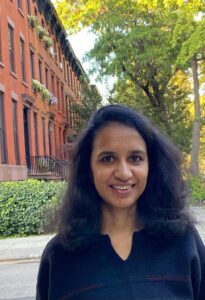 Mythri Prasad-Aleyamma
Mythri Prasad-Aleyamma
Email: mprasad1@gc.cuny.edu
Bio: Mythri Prasad-Aleyamma is a post-doctoral fellow at the Center for Place, Culture, and Politics of the Graduate Center of the City University of New York. She received her Ph.D. from Jawaharlal Nehru University, New Delhi. Her research focuses on the politics of labor, migration, and urban transformation in contemporary India. It traces the different types of recruitment of migrant and local labor in Kerala that reflect political contests and settlements between trade unions, corporate construction companies, and recruitment agencies. Another strand of her research focuses on the politics of indigeneity in Arunachal Pradesh in the North-East of India in the context of urban land governance, dam building, and migration. She has published articles and essays in Antipode,Contemporary South Asia, Society and Space magazine,and Economic and Political Weekly.
Faculty Fellows
Jonathan W. Gray
Email: jgray@gc.cuny.edu
Bio: Jonathan W. Gray, Associate Professor English at the CUNY Graduate Center & John Jay College is the author of Civil Rights in the White Literary Imagination (University Press of Mississippi) and is currently working on the book project Illustrating the Race: Representing Blackness in American Comics. Prof. Gray contributed the essay “Race” to NYU’s Keywords for Comics Studies, co-edited the essay collection Disability in Comics and Graphic Novels for Palgrave McMillian and served as the founding editor of the Journal of Comics and Culture (Pace U. Press). Prof. Gray’s meditations on race and representation in popular culture have appeared in Film Quarterly, The New Republic, Entertainment Weekly, Medium, and Salon.
Laura Y. Liu 
Email:1lauraliu@gmail.com
Bio: Laura Y. Liu is Associate Professor of Global Studies and Geography at The New School where she is an interdisciplinary scholar of space, identity, politics, and power. She trained as an architect and geographer. Her research examines the relationship between political organizing and socio-spatial knowledge, especially around uneven working and living conditions. In particular, her work focuses on community and labor organizing; migration and urban development; and the interplay of politics with art and design. She is interested in creative, experimental, and multi-modal approaches to research and organizing, and the collective production of knowledge and analysis. Liu has researched the US-Mexico border and other border spaces, and has collectively written a photo essay on border images in Anthropology Now (2017). She has written against the novelty of precarity in Women’s Studies Quarterly(2017). With the poet Jennifer Firestone, Liu co-produced the art/chapbook LITtle by LITtle (2014). She has written on the connection between geography and industry in the art exhibit Anne Wilson: Wind/Rewind/Weave (2011); the influence of digital technologies on urban space in Situated Technologies Pamphlet 7: From Mobile Playgrounds to Sweatshop City(2010, with Trebor Scholz); and the impact of September 11 on Chinatown (Indefensible Space, 2007, ed. Michael Sorkin). Her other articles have appeared in Urban Geography; Gender, Place, and Culture; and Social and Cultural Geography.
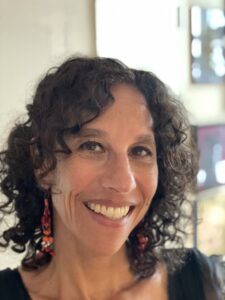
Miriam Ticktin
Email: mticktin@gc.cuny.edu
Bio: Miriam Ticktin is Associate Professor of Anthropology at the CUNY Graduate Center. She has held positions at the New School for Social Research, University of Michigan, and at Columbia University, and she has been a fellow at the Institute for Advanced Study in Princeton, and the Russell Sage Foundation in New York City. She publishes widely on topics such as migration, borders, humanitarianism, and racial and gendered inequalities, and most recently, she has written about the idea of a decolonial feminist commons. She is the author of Casualties of Care: Immigration and the Politics of Humanitarianism in France (University of California Press, 2012), and co-editor of In the Name of Humanity: The Government of Threat and Care (Duke University Press, 2010). She is currently finishing a book on, and against, innocence.

Email: nwallenbrock@hostos.cuny.edu
Bio: Nicole Beth Wallenbrock is an Assistant Professor of French at Hostos Community College and teaches in Film Studies at the Graduate Center. She wrote The Franco-Algerian War through a 21st Century Lens (Bloomsbury, 2020) and co-edited Migrants’ Perspective Migrants in Perspective: World Film with Frank Jacob (Edinburgh University Press, 2021). She currently is researching North African cinematheques.
 Stephen Cassidy Jones
Stephen Cassidy Jones
Email: sjones2@gc.cuny.edu
Bio: Stephen Cassidy Jones is a doctoral candidate in Geography at The Graduate Center, City University of New York. His dissertation project focuses on race, rebellion, and counterinsurgency in California’s super-maximum-security prisons, 1973 – 2013
Kirsten Mairead Gill
Email: kgill@gradcenter.cuny.edu
Bio: Kirsten Mairead Gill is a doctoral candidate in the art history department at the Graduate Center, CUNY. Primarily a scholar of moving image media, her dissertation traces a range of paradigmatic experiments in post-war cinema to argue that the sociality of moving image media was dramatically re-imagined in the light of Black liberation movements from the 1960s-1980s. She demonstrates how the problem of interracial relations was mediated cinematically, pushing toward the disorganization of the cinematic apparatus through methods including psychodrama, the hybridization of genre, media dispersal, and insurrection. The project asks what possibilities exist for solidarity, and for the re-making of social relations in, around, and by the cinema. Kirsten was Mellon Curatorial Fellow at Dia Art Foundation from 2019-2020 and has held positions at the ICA Philadelphia and the Philadelphia Museum of Art. She received a BA in art practice from Bates College and an MA in art history from the University of Pennsylvania.
Stefano Morello
Email: smorello@gradcenter.cuny.edu
Bio: Stefano Morello is a doctoral candidate in English with a certificate in American Studies at the Graduate Center and a Digital Fellow at City College. His academic interests include American Studies, pop culture, and digital humanities. His dissertation, “Let’s Make a Scene! East Bay Punk and Subcultural Worlding,” looks at and listens to the emergence and development of US punk as a performative subculture—an art form on and off the stage—conducive to the production of radical subjectivities. He is also currently working on a book on cultural, architectural, and public health policy responses to immigration, poverty, and disease on the Lower East Side at the turn of the 20th century.
Nick Rodrigo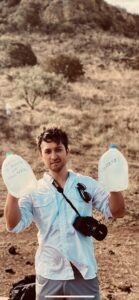
Email: nrodrigo@gradcenter.cuny.edu
Bio: Nick Rodrigo is a doctoral candidate in Sociology at the Graduate Center, CUNY where he is currently writing his PhD thesis titled “Wielding The Border: A genealogy of US-Mexico borderland practices and the purposes they serve from conquest to today”. Through the construction of a robust theoretical lens, archival research and qualitative investigation in the US borderlands he will trace how the practices of bordering have evolved, and the central purpose they serve to the US racial capitalism and the expansion of the security state.
Nick is a founding member of the Social Anatomy of Deportation Regime at John Jay college, where he has coordinated their public events and research projects since its establishment in 2018. He has written several op-eds and book chapters on the state of US-Mexico borderland violence and the nature of detention and deportation proceedings in the US, as well as producing a podcast on the deportation regime in the US called “They Are Just Deportees”.
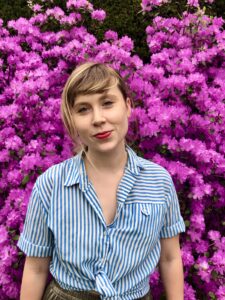 Kaegan Sparks
Kaegan SparksLivia Cangiano Antipon
Email: liviacangiano@gmail.com
Bio: Livia Cangiano Antipon (http://lattes.cnpq.br/8378003332402652) is a PhD candidate in Human Geography at the University of Campinas (Campinas /SP, Brazil). Her research focuses on Urban Political Economy, and at the intersection between urbanization and food supply in the urban networks of the Brazilian Amazon region, specifically in São Luís, the capital city of Maranhão State (Northeast Brazil). She holds an MA in Human Geography from the same university and was a visiting researcher at Food Observatory (ODELA) at the University of Barcelona as well as an exchange student at the Department of Geography, History and Social Sciences at the University of Paris VII. At CPCP, she is a PhD visiting scholar. Livia’s research is supported by the São Paulo Research Foundation (FAPESP), Brazil.
Maria Luisa Mendonça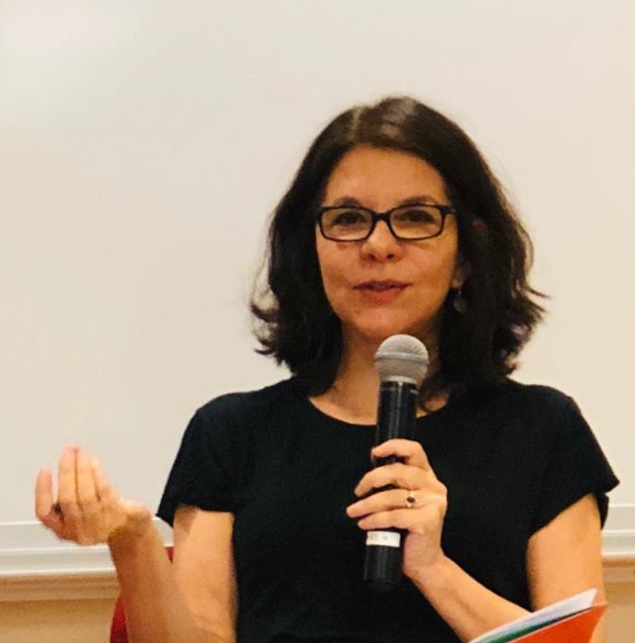
Email: marialuisam222@gmail.com
International financial capital and speculation with farmland in Brazil
Bio: Maria Luisa Mendonça holds a PhD in Human Geography from the Department of Philosophy, Literature and Social Sciences at University of São Paulo/Brazil (USP), and is currently a research scholar at the Center for Place, Culture and Politics at the Graduate Center of the City University of New York (CUNY). Her research includes history and political economy of agriculture, food, land and water systems, and geopolitical processes of resistance by rural social movements in Brazil and internationally. Her book Political Economy of Agribusiness (Annablume, Sāo Paulo, 2018) demonstrates the central role of the food system in international relations as a result of a dialectical movement of economic crisis and expansion in connection with critical areas such as trade agreements, financial markets, environmental justice, and transnational activism. Her current research project anticipated a trend in financial capital to “migrate” to farmland markets in the Global South, especially after the subprime crisis in the United States’ real estate market in 2008. This research on financial markets and land speculation includes building an international network of scholars and social movements throughout Latin America, North America and Europe. She has published her work in refereed journal articles, in public educational reports and in journalistic outlets. Her experience includes documentary filmmaking, investigative journalism, and community based research. She has taught international political economy at University of Rio de Janeiro (UERJ) and at the center for advanced research Fundação Getúlio Vargas (FGV), and was a visiting scholar at Cornell University in 2013. Mendonça is a co-founder of the World Social Forum and has served in expert meetings on the Right to Food for UN-Women, the Food and Agriculture Organization (FAO), and the United Nations Human Rights Commission. She is the founder of Rede Social de Justiça e Direitos Humanos (Network for Social Justice and Human Rights – www.social.org.br) in Brazil and the editor of the book “Human Rights in Brazil,” published annually since 2000.
 Cristiano Nunes Alves
Cristiano Nunes Alves
Email: cris7cris7@yahoo.com.br
Bio: Cristiano Nunes Alves is PhD in Geography (2014) from the University of Campinas (Brazil), also participated in University of São Paulo’s Postdoctoral Program in Geography (2017), and in the PhD Professional Development course in Geography at the Université Sorbonne Nouvelle – Paris, France (2011–2012). Currently is professor at the State University of Maranhão (Brazil), teaching both undergraduate and graduate Geography courses and coordinating the “Núcleo de Estudos em Território, Cultura e Planejamento” [Center for the Study of Territory, Culture and Planning] (MARIELLE FRANCO-UEMA). Have been developing researches in urban geography and epistemology of geography on subjects such as cultural circuits, music and phonographic production, communication and information, social movements, modernizations in the Amazon region, and housing. Is postdoctoral fellowship at the Center for Place, Culture and Politics/City University of New York (CPCP-CUNY).
Sónia Vaz Borges
Email: soniavazborges@gmail.com
Bio Sónia Vaz Borges is a militant interdisciplinary historian and social-political organizer. She received her PhD in History of Education from the Humboldt-Universität zu Berlin (HU). She is the author of the book Militant Education, Liberation Struggle, Consciousness: The PAIGC education in Guinea Bissau 1963–1978 (2019). As a result of her research Vaz Borges co-authored the short films, Navigating the Pilot School” (2016) andMangrove School (2022). She is currently an Assistant Professor in History and Africana Studies Program at Drexel University in Philadelphia (USA). Vaz Borges continues to write on education and liberation struggles and is now developing a book proposal focused on her concept of the “walking archive” and the process of memory and imaginaries.
Ana Vilenica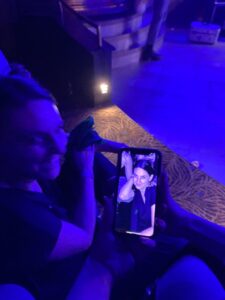
Email: vilenica.ana@gmail.com
Bio: Ana Vilenica is a Post-Doctoral Research Fellow for the European Research Council project ‘Inhabiting Radical Housing’ at the Polytechnic and University of Turin’s Inter-university Department of Regional & Urban Studies and Planning (DIST) and a member of the Beyond Inhabitation Lab. She is a member of the Radical Housing Journal collective. She has edited five books, including Radical Housing: Art, Struggle, Care (Institute of Networked Culture in Amsterdam 2021), and Decoloniality in Eastern Europe: A Lexicon of Re-orientation (forthcoming). Ana Vilenica is a long-term housing, feminist, and no-borders activist in Serbia, the UK, and at the European level. Most recently, she has been organizing with an anti-eviction movement in Serbia, EAST (East European Essential Struggles Transnational), and The European Action Coalition for the Right to Housing and the City. She is currently researching transnational organizing in and beyond radical housing struggles.



